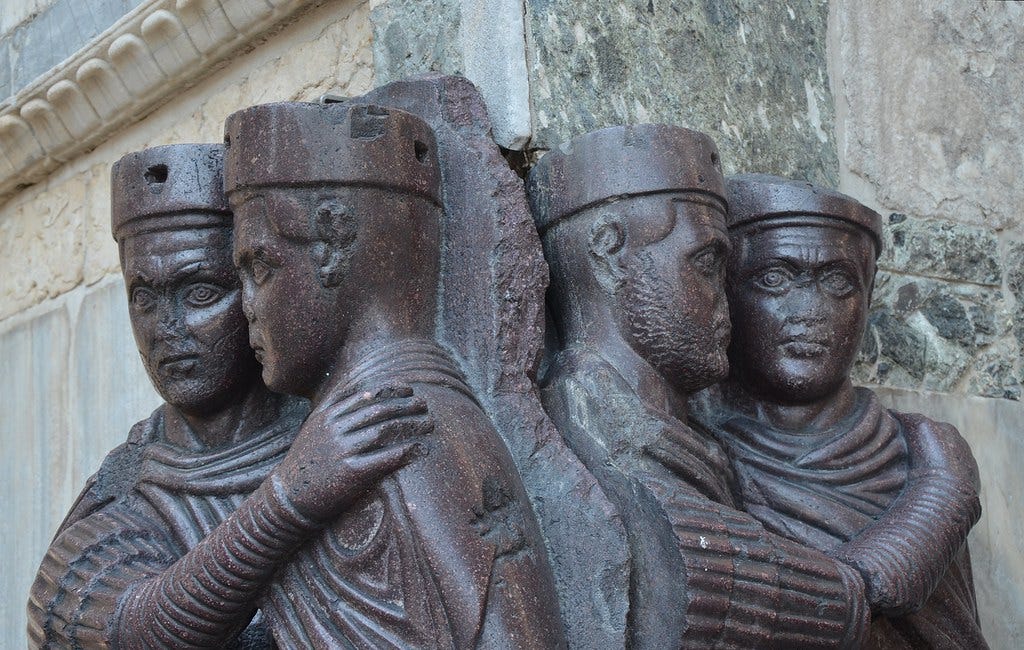The ruthless, first Christian Emperor of Rome
Review of The Life and Times of Constantine the Great by D. George Kousoulas
Normally, I avoid vanity press books because I want an outside editor involved in a book's development. Had I known that this was a self-published work, I almost certainly would have gone for something more academic. Nonetheless, this book proved me wrong: it is a high-quality biography by a non-specialist that is readable and consistently interesting.
My biggest fear, on reading the cover, was that this was a Christian treatment rather than a secular history. Even though the author is an Archon of the Greek Orthodox church, I had no reason to fear: this book is as secular as can be, constantly sifting through evidence and judging events by common sense rather than faith or some mystical assertion.
Constantine the Great is a watershed historical figure. In a civil-war aftermath of the disintegration of Diocletian’s tetrarchy, in 312 Constantine found himself in a life-and-death battle with Maxentius. Facing a force twice the size of his own, the night before the battle Constantine was reported to have had a dream of Christ telling him to adopt the symbol of the labarum (a combination of the Greek letters Chi and Rho to form ☧, which meant Christos [ΧΡΙΣΤΟΣ]). He won the battle and emerged a changed man. Or so the story goes.
At any rate, he ended the heavy persecution of Christians begun under Diocletian and began to favor them in his appointments into the Roman bureaucracy, which signaled imperial favor and helped what was then a cult to spread. He did not impose Christianity on anyone, but rather advocated tolerance of all religion. On his deathbed, he was baptized; it was said he had come to believe that he was the 13th apostle, who would use the new religion to unite the empire. He also founded Constantinople, later the imperial seat of Byzantium for the next 1100 years.
In some interpretations, beyond perhaps feeling a very real faith, Constantine also recognized that Christian images of power could be used to justify his own political legitimacy. He would serve as God’s representative on Earth and rule with the same absolute power that God did in heaven.
Behind this, Constantine comes off as an extremely interesting figure. Born to an innkeeper's daughter, who "serviced" his high-ranking father as he passed through Illyria, he entered Roman state service at an early age and, while observing his shrewd father and the Emperor Diocletian, was trained in the art of gaining and holding power, from military strategy to propaganda and the use of any means to eliminate rivals. Needless to say, he exhibited a ruthless genius, even executing his son and 2nd wife, who were supposedly having a treasonous affair that threatened his authority. (She was boiled to death in a bath.)
This book follows his career in great detail, from how he beat his rivals and his military campaigns to his numerous attempts to unite the fractious Christian Church. This is very interesting as a window into the times, in a completely comprehensible way. For example, in the Arian controversy, rival Christians were arguing over whether Jesus as the son of God could be as timeless and divine as his father or was somehow more of a temporal being (the Arian view, which drew into question Christ's teachings and hence the New Testament itself). This was partially resolved by stating that while not as old as God, Jesus was "of the same substance". People were executed for their opinions on such matters.
The book is written clearly and is full of good stories. The author never gets bogged down in academic disputes. However, the prose is occasionally somewhat Baroque and the examination of certain controversies a bit recondite. Nonetheless, I would recommend this book.
Related reviews:
How Roman Emperors used Christianity to enhance their power
The title of this book made me fear it was a New Atheist screed that would blame everything on Christianity. This is a disservice. After long hesitating to pick it up, I was delighted to find a detailed and profound inquiry into one of the most significant periods in western history, i.e. how Christianity triumphed over previous religions and what it me…
Intellectual history on the political impact of early Christianity
This book offers a detailed interpretation of what Christianity meant and the political impact that it had. Siedentop takes the reader on a long historical inquiry, from before the Bronze Age to the end of the Middles Ages and supposedly to the present day. While disagreeing with much of it, I was riveted by the ideas from the first page.
My Favorite Roman Emperor
Beyond his persecutions of the Christians, the Emperor Diocletian is hardly known. If nothing truly dramatic occurred during his reign, something a narrative could be built around, he was a fundamental innovator in governance, administration, and military strategy. Indeed, he saved the Roman Empire after a 50-year period of disintegration and chaos. He …







